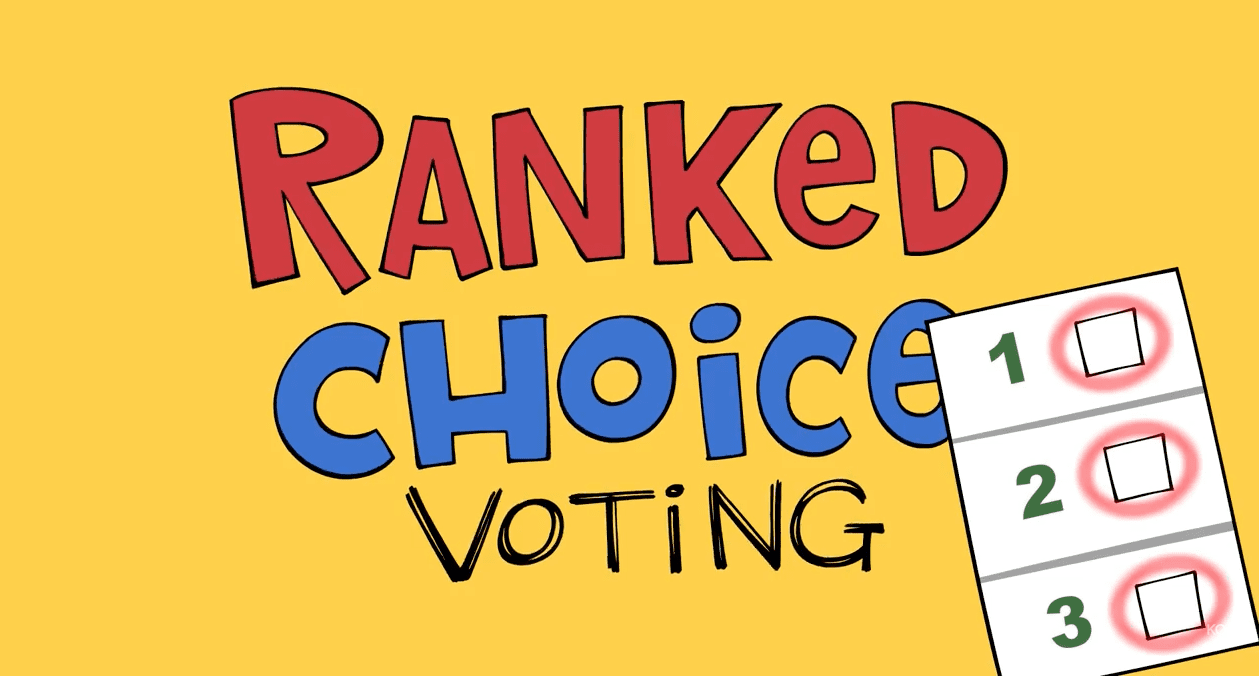BY MARK Y.A. DAVIES
 Think about how many political candidates get elected to office with a majority of voters opposing their election owing to votes being split among other candidates because we do not have Ranked Choice Voting.
Think about how many political candidates get elected to office with a majority of voters opposing their election owing to votes being split among other candidates because we do not have Ranked Choice Voting.
Think of all the people outside of the two major parties who might be empowered to run for office if we had Ranked Choice Voting and they did not have to worry about taking votes away from the major party candidate who is closer to their views.
Think about how much more civil opposing candidates might be in relation to each other if we had Ranked Choice Voting and candidates realized that even though a person might vote for an opposing candidate as her or his first choice, they still might be that voter’s second or third choice as opposed to that voter’s last choice.
Think about how candidates might have to talk much more about their ideas and plans and what they are for instead of whom and what they are against if we were to implement Ranked Choice Voting because the candidates would have to give people reasons to vote for them rather than simply voting against another candidate.
Think about how many more people might actually show up at the polls to vote if we had Ranked Choice Voting, and people knew they could vote their first choice every time without it being seen as a wasted vote or a spoiler vote.
Think about how much more difficult it might be for big money to sway elections by negatively targeting candidates if we have Ranked Choice Voting. Perhaps such targeted attacks might lower the ranking that a voter gives a candidate, but it will not likely make the voter rank his or her least favorite candidate any higher.
Think about how much money could be saved in our election processes over a period of time if we had Ranked Choice Voting and could avoid costly and time-consuming run-off elections that are often plagued by poor voter turnout.
Think about how much more motivated young people might be to vote if we had Ranked Choice Voting and they knew that they could vote for their ideals and their favorite candidate without potentially helping the candidate they would least like to see elected.
Think about the new people, voices, and viewpoints that would make their way into the public sphere if we had Ranked Choice Voting and candidates would not have to be concerned about the appearance or the reality of being a spoiler or a vote splitter.
Think about how badly we need to hear the ideas and perspectives of a more diverse field of candidates that would be made more possible by Ranked Choice Voting.
With all of these benefits to our democratic processes and the potential to significantly increase the breadth and depth of political participation in our society, one might ask the question, “Who would ever be against implementing Ranked Choice Voting?”
One could make a case that these would be the people who are not particularly concerned whether elected officials can garner a majority of the votes to win an election, who are not particularly concerned about hegemony of the two major parties in our political processes, who are not overly concerned about the lack of civility in our political discourse in the two-party system and the bifurcation of our society that such incivility fosters, who don’t mind that our current system rewards negative attacks on political opponents as much or more as presenting positive plans and ideas, who perhaps actually want votes for third-party candidates to end up being wasted or spoiler votes and who benefit when the votes are split among candidates with somewhat similar views, who do not necessarily want to see parties outside the two major parties gain any traction in our democracy, who are not overly concerned with costly runoff elections with sparse turnout, who are not particularly concerned with having a greater diversity of candidates who might motivate a more diverse electorate to come to the polls.
In other words, people who are opposed to Ranked Choice Voting tend to be those who are the most satisfied with the status quo of our political system, and I think the evidence is pointing towards this group being a minority of our citizenry rather than the majority.
As Oklahomans, in a state with extremely low political participation [especially among young people], an extreme lack of diversity in our elected officials, a high percentage of unopposed elections, a very weak presence of political parties beyond the big two, and an increasing lack of civility in our campaigns and political discourse; let us commit to work together to make sure the people of Oklahoma have an opportunity to vote on a state question in 2020 that will implement ranked choice voting in our elections.
Ranked Choice Voting is critical to increasing political participation and political diversity within our state. No one should have to avoid voting for her or his first choice candidate at the polls. Please join the movement to make Ranked Choice Voting a reality in Oklahoma at Oklahomans for Ranked Choice Voting.
– Mark Y.A. Davies is the Wimberly Professor of Social and Ecological Ethics and director of the World House Institute for Social and Ecological Responsibility at Oklahoma City University. Click here for more of his essays.
Editor’s Note: To see a brief video explanation of Ranked Choice Voting, produced by Northern California’s KQED public radio, click here.
Illustration: KQED







